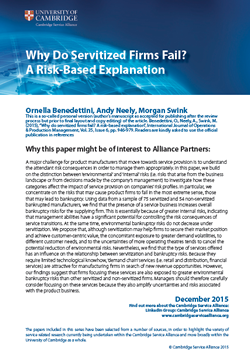
Submitted by Angela Walters on Wed, 16/12/2015 - 11:11
The December paper 'Why Do Servitized Firms Fail - A Risk-Based Explanation' by Ornella Benedettini, Andy Neely and Morgan Swink
'Why Do Servitized Firms Fail? A Risk-Based Explanation’
Ornella Benedettini, Andy Neely, Morgan Swink
A major challenge for product manufacturers that move towards service provision is to understand the attendant risk consequences in order to manage them appropriately. In this paper, we build on the distinction between ‘environmental’ and ‘internal’ risks (i.e. risks that arise from the business landscape or from decisions made by the company’s management) to investigate how these categories affect the impact of service provision on companies’ risk profiles.
In particular, we concentrate on the risks that may cause product firms to fail in the most extreme sense, those that may lead to bankruptcy. Using data from a sample of 75 servitized and 54 non-servitized bankrupted manufacturers, we find that the presence of a service business increases overall bankruptcy risks for the supplying firm. This is essentially because of greater internal risks, indicating that management abilities have a significant potential for controlling the risk consequences of service transitions. At the same time, environmental bankruptcy risks do not decrease under servitization.
We propose that, although servitization may help firms to secure their market position and achieve customer-centric value, the concomitant exposure to greater demand volatilities, to different customer needs, and to the uncertainties of more operating theatres tends to cancel the potential reduction of environmental risks. Nevertheless, we find that the type of services offered has an influence on the relationship between servitization and bankruptcy risks. Because they require limited technological knowhow, ‘demand chain’ services (i.e. retail and distribution, financial services) are attractive for manufacturing firms in search of new revenue opportunities. However, our findings suggest that firms focusing these services are also exposed to greater environmental bankruptcy risks than other servitized and non-servitized firms. Managers should therefore carefully consider focusing on these services because they also amplify uncertainties and risks associated with the product business.



